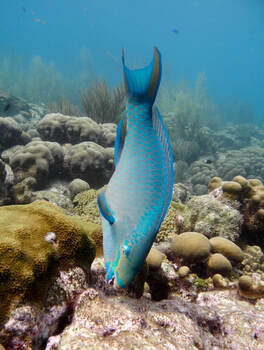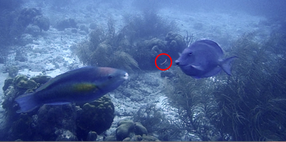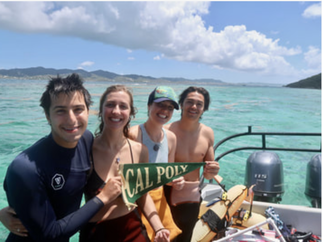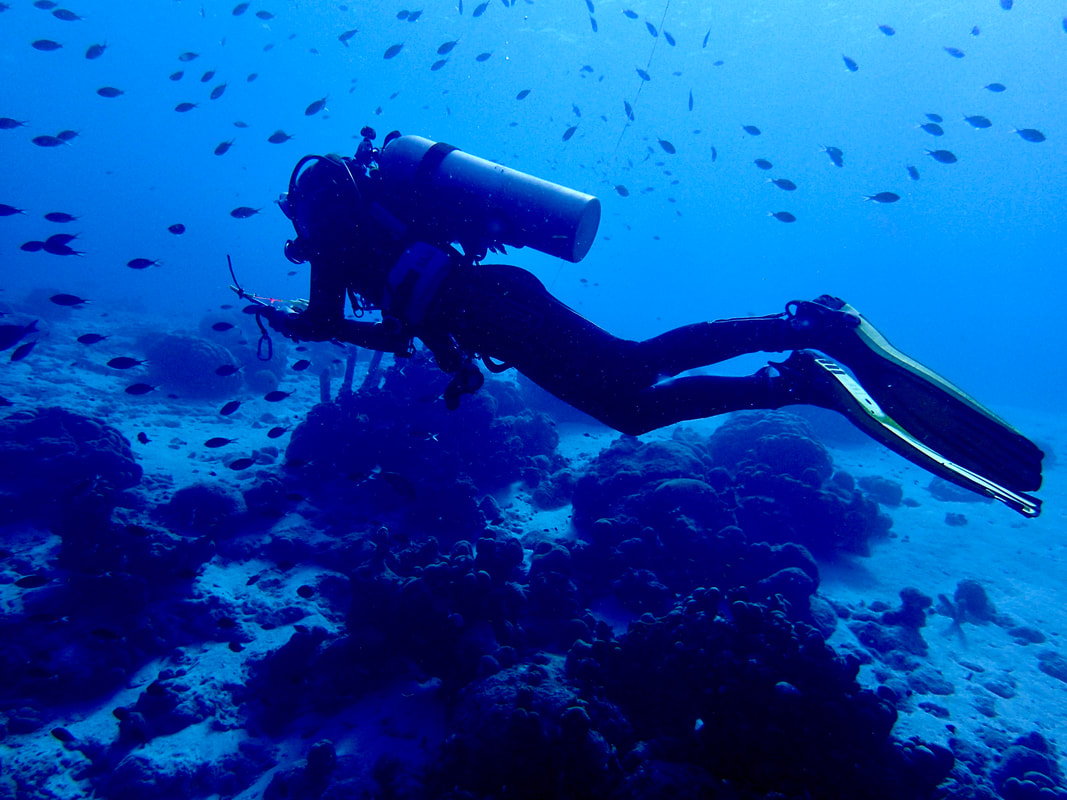Impacts of Parrotfishes on Caribbean Coral Reefs

Parrotfishes are major herbivores on coral reefs that have an important functional role grazing algae that can otherwise overgrow or outcompete corals. A primary management across many regions of the Caribbean is to promote coral reef resilience by maintaining abundant populations of parrotfishes and other herbivores to help regulate algae growth on reefs. Islands like Bonaire and Bermuda have banned the harvest of parrotfishes altogether, yet parrotfish fishing pressure is high on islands like Jamaica and St. Croix, US Virgin Islands.
Parrotfishes primarily graze upon algae, but some species occasionally eat live coral (corallivory) in addition to other food sources. While they graze coral infrequently, this predation can lead to partial to total mortality of coral recruits and established colonies, and may reduce coral reproductive output and growth. The challenge is that we currently have a limited understanding of the patterns and impacts of corallivory for corals.
To assess the net impacts of parrotfishes on coral reefs across the Greater Caribbean, our lab and collaborators have been studying the positive and negative impacts of parrotfish grazing upon algae, coral, and other food sources across the Florida Keys, St. Croix, and Bonaire. Additionally, we are investigating the importance of coprophagy (consumption of feces) in the diet of parrotfishes and surgeonfishes to better understand their complex feeding behavior.
Parrotfishes primarily graze upon algae, but some species occasionally eat live coral (corallivory) in addition to other food sources. While they graze coral infrequently, this predation can lead to partial to total mortality of coral recruits and established colonies, and may reduce coral reproductive output and growth. The challenge is that we currently have a limited understanding of the patterns and impacts of corallivory for corals.
To assess the net impacts of parrotfishes on coral reefs across the Greater Caribbean, our lab and collaborators have been studying the positive and negative impacts of parrotfish grazing upon algae, coral, and other food sources across the Florida Keys, St. Croix, and Bonaire. Additionally, we are investigating the importance of coprophagy (consumption of feces) in the diet of parrotfishes and surgeonfishes to better understand their complex feeding behavior.
Our Research (now wrapping up)

Our research on the impacts of parrotfish coral predation seeks to address questions such as:
Additional research–feces consumption by nominally herbivorous Caribbean fishes: Parrotfishes and surgeonfishes are important herbivores on Caribbean reefs, but did you know that they also consume fish feces (a behavior known as coprophagy)? Research led by former master's student Hannah Rempel and undergraduate Abigail Siebert documented species-specific levels of coprophagy by a wide range of Caribbean parrotfishes and surgeonfishes. To our knowledge, this is the first study documenting this behavior in the region! They found that they predominantly feed upon the feces of an abundant planktivore, the Brown Chromis, and that these feces may be an important source of nutrients. (Rempel, Siebert et al. 2022) |
Previous Research
Our previous research on parrotfish grazing behavior has helped address questions such as:
We've published several papers in the last few years, led by our group and in collaboration with the Burkepile Lab at UCSB, including:
- How much species-to-species variation is there is parrotfish feeding preferences on algae and other food sources such as sponges and coral?
- How their grazing behavior vary depending on local community composition of reefs?
We've published several papers in the last few years, led by our group and in collaboration with the Burkepile Lab at UCSB, including:
- Estimates of total grazing impact of parrotfishes (Ruttenberg et al. 2019);
- Parrotfish feeding preferences for certain corals and sponges (Burkepile et al. 2019);
- The mechanics of parrotfish grazing (Adam et al. 2018);
- Species-specific foraging preferences of parrotfish for algae (Adam et al. 2015B);
- A broad synthesis of what we know – and don't know – about the importance of grazing for reefs (Adam et al. 2015A).
Data Availability
Data from these studies are publically available through NOAA's National Centers for Environmental Information:
- Patterns of parrotfish predation on Orbicella annularis and coral tissue regeneration from bite scars on the Caribbean islands of St. Croix and Bonaire from 2018-07-02 to 2019-08-24 (NCEI Accession 0213589)
- Abundance and biomass of parrotfishes (Labridae, Scarinae) in St.Croix, U.S. Virgin Islands 2015 to 2016 (NCEI Accession 0172377)
- Behavior of parrotfishes (Labridae, Scarinae) in St. Croix from 2015-07-06 to 2015-07-26 (NCEI Accession 0157087)
- Parrotfish census and foraging parameters in the Florida Keys National Marine Sanctuary from 2013-05-01 to 2013-07-31 (NCEI Accession 0185785)
- Abundance and behavior of parrotfishes (Labridae, Scarinae) in the upper Florida Keys from 2013-06-19 to 2013-07-30 (NCEI Accession 0127525)

